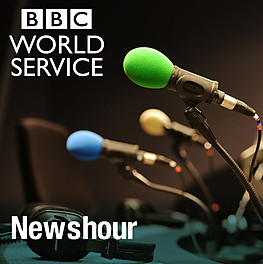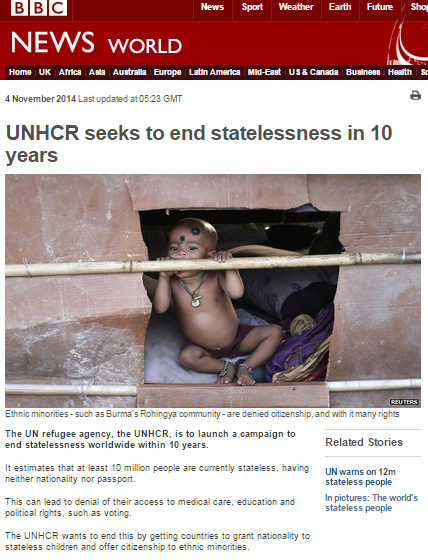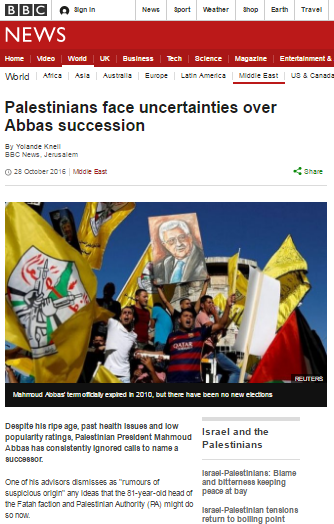The December 17th afternoon edition of the BBC World Service radio programme ‘Newshour‘ included a thirteen-minute item which made use of part of Mishal Husain’s broadcast from the Gaza Strip that listeners to BBC Radio 4 had heard earlier in the day.
Presenter Jon Donnison introduced that item (from 30:06 here) using framing identical to that previously heard in the Radio 4 ‘Today’ programme. [emphasis in italics in the original, emphasis in bold added]
Donnison: “Gaza’s economic statistics make for grim reading. According to the World Bank 54% of the labour force in the tiny Palestinian territory is unemployed. The figure goes up to 70% for youth unemployment. Around eight out of every ten Gazans are dependent on food aid and around half of Gaza’s population of around 2 million people are registered refugees. Well today the UN is launching an appeal to raise $350 million for Palestinian refugees who it says are in dire humanitarian need. It comes after the United States cut hundreds of millions of dollars of UN funding destined for Palestinians. The economy’s been impacted by a blockade maintained by Israel and Egypt – they say for their security – and incomes have also been affected by Palestinian Authority sanctions on Hamas, the movement which has been in power in Gaza since 2007. Well the BBC’s Mishal Husain visited one of the refugee camps with Matthias Schmale, head of Gaza operations for the UN agency for Palestinian refugees.”
Contrary to Donnison’s claim, the UN appeal for $350 million does not specify “Palestinian refugees” as the beneficiaries.
Listeners then heard Mishal Husain’s ‘Shati walkabout’ interview with Matthias Schmale which did not include any challenge whatsoever to UNRWA’s politicised messaging or any background information concerning that organisation and its mission, Hamas’ financial prioritisation of terrorism over civilian welfare and the effects of the Hamas-Fatah dispute on the Gaza Strip’s economy.
At 36:57 Jon Donnison then introduced an interviewee whose participation was obviously intended to reinforce the BBC’s highly selective framing of the ‘Gaza economic crisis’ story.
Donnison: “Well Sharren Haskel is a member of the Knesset – Israel’s parliament. She’s with the governing Likud party and also sits on the foreign affairs and defence committee. […] Ehm, first of all, how has Israel and Israeli citizen benefited from this blockade?”
Haskel: “Well you know your report actually brings out something that’s quite concerning because it’s very easy – and this is something that’s being repeated time after time – to sort of blame Israel for all the problems. But it’s really sort of letting Hamas off the hook…”
Donnison [interrupts]: “Well we heard…we heard the UN chap there being quite critical of Hamas. I’m asking you how has Israel…how has this blockade helped Israel’s citizens over the past 12 years?”
As Haskel spoke about Hamas’ investment of funding in cross-border tunnels and weapons rather than infrastructure and social services for the citizens of the Gaza Strip, Donnison interrupted her again.
Donnison: “No but you’ve…you’ve made…you’ve made that point several times so I’ll ask you a third time – how has the blockade helped Israelis, particularly those living on the border? Because it hasn’t worked, has it? It hasn’t made them safer. We’ve had three wars in the past 12 years. Thousands and thousands of rockets coming out of Gaza – they’re still coming out. You’d acknowledge that. It’s not worked, has it?”
Haskel: “Well to be honest this is not a blockade. You have Gaza and you have an independent entity. So they really have an autonomy to dictate their own future. They could have turned Gaza into a Singapore. They…”
Donnison [interrupts]: “Yeah, yeah, you’ve made that…you’ve made that point. My point is that as…as you know Israel probably needs to be looking at alternatives to the blockade which isn’t working, is it?”
As is all too frequently documented here, the BBC serially avoids stories which would provide its audiences with understanding of why Israel’s counter-terrorism measures are necessary – for example:
BBC News again ignores abuse of Israeli humanitarian aid to Gaza
BBC ignores another story explaining the need for Gaza border restrictions
Documenting the BBC’s continuing silence on Gaza smuggling
BBC waives another chance to explain why Gaza’s naval blockade exists
BBC News passes up chance to explain why Israeli counter-terrorism measures exist
Had the BBC reported those stories and countless others, Donnison would of course not have been able to promote his facile and obviously politically motivated ‘blockade isn’t working’ theme quite so easily.
After Haskel had noted the entry of goods into the Gaza Strip, the exit of people, the electricity supplied to Gaza by Israel and other humanitarian efforts, she observed that Egypt’s counter-terrorism measures do not garner the same criticism as Israel’s measures. Donnison interrupted with the following snide remark:
Donnison: “Well I’m speaking to you, aren’t I?”
As Haskel explained the background to Egypt’s policy and the efforts made by Israel to balance humanitarian aid with security, Donnison interrupted her yet again.
Donnison: “There are…there are many Palestinians in Gaza…there are many Palestinians in Gaza – possibly the majority – who are sick and tired of Hamas. But some would say that you are doing little to help ordinary Palestinians. The UN says you are in effect collectively punishing them.”
Listeners were not provided with any evidence to support Donnison’s claim that “many” Gazans and even “possibly a majority” are dissatisfied with Hamas. Haskel pointed out that if that is the case, then it is the residents of the Gaza Strip who have to do something about it.
Donnison: “Did you welcome the US cutting of funding to the UN refugee agency? Did you think that was helpful?”
Haskel replied that she did think it was helpful and began talking about another topic which the BBC serially avoids: Hamas’ manipulation of UNRWA. Donnison promptly interrupted her yet again.
Donnison: “Well can I just…can I just quote you the former IDF spokesperson Peter Lerner saying ‘Less American aid to Palestinians means more violence against Israelis. It isn’t in Israel’s interest.'”
Donnison of course did not bother to inform listeners that in that same Ha’aretz opinion piece, Lerner also highlighted UNRWA’s “many problems, including its politics, determined since 1949 by their one-sided mandate” and the fact that “Palestinian refugee camps have been hotbeds for terrorist activities”: additional topics studiously avoided by the BBC.
Indeed, when Sharren Haskel began talking about the glorification of terrorism in UNRWA school books and the fact that international funding “is going into perpetuating violence and hatred”, Donnison interrupted her twice and closed the interview.
While Jon Donnison’s Middle East politics have never been much of a secret, it is worth noting that the BBC’s framing of its much promoted ‘Gaza economic crisis’ story has now evolved from the notion that the “deplorable” situation in the Gaza Strip is essentially the result of the “blockade” imposed by Israel and Egypt to the notion that the “deplorable” situation in the Gaza Strip is essentially the result of a “blockade” imposed by Israel that “hasn’t worked” and is hence – by implication – unjustified.
Related Articles:
BBC Radio 4 ‘Today’ Gaza Strip special – part three
Revisiting a 2014 BBC report by Jon Donnison
Revisiting a five year-old BBC story
Jon Donnison’s breach of BBC editorial standards unravels
BBC’s Jon Donnison breaches editorial guidelines in straw-clutching Tweet




